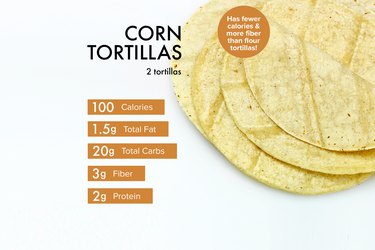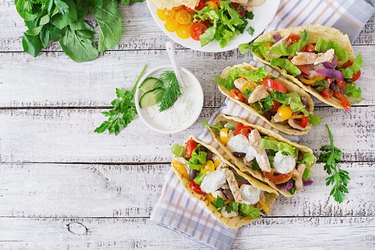
Are you team corn or team flour when it comes to your tortillas? Maybe you play both sides — nothing wrong with that, but corn tortillas have more good things going for them than many of us realize.
Corn tortillas are made with only three ingredients: masa harina (corn flour), water and salt. You can make your own, which helps you control the ingredients, or you can grab a pack at the grocery store. Store-bought corn tortillas are often are uniform in their size, which can help with portion control.
Video of the Day
Video of the Day
While they're a staple in Tex-Mex cooking, you shouldn't feel limited to one cuisine when it comes to corn tortillas.
Corn Tortilla Nutrition Facts
A single serving of corn tortillas is two tortillas. Two taco-sized corn tortillas (47 grams) contain:
- Calories: 100
- Total fat: 1.5 g
- Cholesterol: 0 mg
- Sodium: 9.9 mg
- Total carbohydrates: 20 g
- Dietary fiber: 3 g
- Sugar: 2 g
- Added sugar: 0 g
- Protein: 2 g
Corn Tortilla Macros
- Total fat: Two corn tortillas will give you 1.5 grams of fat, with a half gram coming from polyunsaturated fat. Corn tortillas do not contain saturated fat or trans fat, unless they are prepared with oil, butter or lard.
- Carbohydrates: Two corn tortillas have 20 grams of carbs, which includes 3 grams of dietary fiber and 2 grams of naturally occurring sugar.
- Protein: One serving of corn tortillas provides 2 grams of protein.
Vitamins, Minerals and Other Micronutrients
- Phosphorus: 9% of your Daily Value (DV). Check out more foods high in phosphorus.
- Magnesium: 6% DV
- Iron: 4% DV
- Copper: 3% DV
- Calcium: 2% DV
- Potassium: 2% DV
- Two corn tortillas are not a significant source of vitamins A, B12, C, D and E (0% DV)
Corn Tortillas vs. Other Grains
Per 1 tortilla or 1 slice of bread | |||||
Calories | 50 | 90 | 120 | 80 | 81 |
Total fat | 0.5 g | 1.5 g | 3 g | 1 g | 1 g |
Carbohydrates | 10 g | 17 g | 19 g | 14.8 g | 13.7 g |
Dietary fiber | 1.5 g | 0 g | 1 g | 0.8 g | 1.9 g |
Protein | 1 g | 3 g | 3 g | 2.7 g | 4 g |
Health Benefits of Corn Tortillas
Corn tortillas are naturally gluten-free, but because of the processing from the corn to the masa harina, some of the nutrients can be lost. However, the important nutrients maintained may help fill some gaps in the diet.
1. It's a Low-Calorie Choice
Compared to other grains, gram for gram, corn tortillas have fewer calories. If you are on a calorie-restricted diet or looking for lower-calorie choices, corn tortillas may be a good option for you. You can use corn tortillas in place of flour tortillas or bread.
When corn is fresh, it's considered a vegetable, but when it's dried, it's considered a grain, according to the Whole Grains Council. That means it counts toward your grain servings for the day.
2. It's a Gluten-Free Choice for People With Celiac Disease
Celiac disease (CD) is an autoimmune condition that causes gluten — the protein found in wheat, rye and barley — to damage and trigger inflammation in the small intestine. If you have CD or have an allergy or intolerance to gluten, many other grains are out of the question, but corn tortillas are a good choice.
Corn and products made from corn, when processed in a gluten-free facility, are safe for people with CD.
Tip
Look for a gluten-free seal on your package of store-bought corn tortillas to ensure they're made without gluten and in a gluten-free facility to avoid potential cross-contamination. Making corn tortillas yourself is also an option.
3. They Provide Some Iron, Calcium and Fiber
Corn tortillas aren't an excellent source of any one nutrient, but they do provide some calcium and iron, which are often nutrients of concern for parents of picky children.
Adults will get 4 percent and 2 percent of the DV for iron and calcium, respectively; but for children aged 1 to 3, the RDA for iron is 7 milligrams, so two corn tortillas provide 10 percent of the RDA. For toddlers, the RDA for calcium is 700 milligrams, so two corn tortillas give your little ones about 3 percent of the RDA. Two tortillas might seem like a lot for your toddler, but they might love them baked into chips as a snack and dipped in yogurt ranch.
One serving of corn tortillas will also provide 3 grams of fiber. This is considered a good source of fiber for women, who's recommended daily intake of fiber is 25 grams, according to the Academy of Nutrition and Dietetics. Men need 38 grams per day, so four corn tortillas (two servings) would provide 15 percent of their daily fiber needs. (To be considered a "good source" of a nutrient, it must provide 10 to 19 percent of the DV.)
Corn Tortilla Health Risks
Food Allergies
Corn is not one of the top eight food allergens, according to the Mayo Clinic, but that doesn't mean you can't be allergic to corn. If you think you might have a corn allergy, don't eat corn tortillas and make an appointment with your doctor for a diagnosis.
Some store-bought corn tortillas may have extra ingredients used as fillers or preservatives. Always check the ingredient list to ensure you do not have any sensitivities to those.
Drug Interactions
There are no known drug interactions with corn or corn tortillas.

How to Make Corn Tortillas
Making your own tortillas at home is relatively easy. Follow these tips for flawless tortilla-making:
- If you have a tortilla press, that's your best tool for making tortillas, but it's not necessary. A rolling pin works well, too.
- You must use masa harina; cornmeal won't work. Masa harina is a very fine corn flour that has been soaked in a lime solution and dried.
- Masa harina is easy to find in most grocery stores, but also a staple in Mexican food stores.
Things You'll Need
2 cups masa flour
1.5 cups water
1/4 teaspoon table salt
Bowl
Plastic wrap
Tortilla press or rolling pin
Non-stick or cast-iron skillet
Spatula
Step 1
Mix masa flour, water and salt. Your masa bag will have ratios, but typically, it's 2 cups of masa flour to 1.5 cups of water, plus 1/4 teaspoon salt to make 12 corn tortillas.
Step 2
Work the dough until it thoroughly comes together into one big ball, and divide into 12 smaller balls
Step 3
Get two pieces of plastic wrap or a plastic storage bag cut into 2 squares. If you're using a press, place one piece of plastic on the press, place a dough ball in the center and place the other piece of plastic on the top and press it. If using a rolling pin, follow the same procedure but roll out the ball until it is about 1/8-inch thick.
Step 4
Heat a non-stick or cast-iron skillet over medium-high heat and place one flattened tortilla on the skillet. After about 2 minutes, it will start to lightly brown on one side. Once it does, flip it and do the same on the other side. Repeat until all the tortillas are cooked.
Step 5
Let them cool and use immediately or store in a sealed container in the fridge.
Recipes Using Corn Tortillas
Creative Ways to Use Corn Tortillas
- Fried corn tortillas are often used for tostadas, but try baking them instead for a healthier version. Spray your tortillas with an olive oil spray, place on a baking sheet and bake for 8 minutes at 350 degrees Fahrenheit. Let them cool to crisp up even further.
- Cut your tortillas into triangles and make your own chips (you can use the same method as above).
- Use corn tortillas to layer a casserole instead of pasta.
- Bake your tortillas into a dessert by sprinkling them with cinnamon and sugar before putting them in the oven to crisp up.
- My Food Data: "Corn Torillas, Corn"
- Mayo Clinic: "Food Allergies, Understanding Food Labels"
- Whole Grains Council: "Corn - October Grain of the Month"
- Academy of Nutrition and Dietetics: "Fiber"
- My Food Data: "Soft Flour Tortillas"
- My Food Data: "6-Inch Whole Wheat Tortillas"
- My Food Data: "White Bread"
- My Food Data: "Whole Wheat Bread"
- National Institutes of Health: "Iron"
- National Institutes of Health: "Calcium"